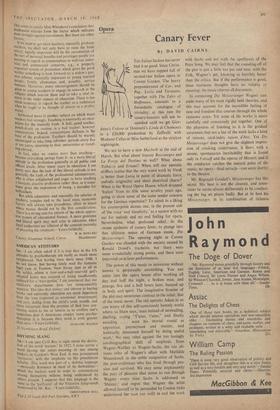Opera
Canary Fever
By DAVID CAIRNS
We are to have a new Macbeth at the end of March. But what about Simone Boccanegra and La Forza del Destino as well? What about Nabucco and Ernani? When will our operatic skifilers realise that the very worst work by Verdi is better than Lucia in point of dramatic force, melodic originality and sheer theatrical charm? When is the Royal Opera House, which dropped 'Italian' from its title some seventy years ago, going to show some of the same tender concern for the German repertoire? To admit to a liking for counterpoint damns one, in the present cult of 'the voice' and 'simplicity,' as a square with no ear for melody and no real feeling for opera. Nevertheless, what profound relief, in the recent epidemic of canary fever, to plunge into that ultimate ocean of German music, Die Meistersinger. The opening night at Covent Garden was clouded with the anxiety caused by Ronald Dowd's tracheitis but there were some wonderfully strong points, and these were improved on at later performances.
The power of this music to intoxicate without nausea is perpetually astonishing. You can totter into the opera house after working all day and half the night, a broken man, and emerge, five and a half hours later, buoyed up in body and spirit. The imaginative frontier of the plot may sometimes contract in the mind; that of the music never. The old operatic Adam in us can weary of this self-consciously homely world where, as Shaw says, 'man instead of serenading, duelling, crying "T'amo, t'amo," and finally suiciding . . . went his mortal round as apprentice, journeyman and master, and habitually demeaned himself by doing useful work.' We may rebel against the too lovingly autobiographical shift of emphasis from Wagner-Walther to Wagner-Sachs, the too ob- vious echo of Wagner's affair with Mathilde Wesendonck in the noble resignation of Sachs, the poet-craftsman who has lived through pas- sion and survived. We may sense unpleasantly the purr of pleasure that seems to run through Wagner every time Sachs is addressed as 'Meister,' and regret that Wagner the artist allowed himself to be persuaded by Cosima (who understood her man too well) to end the work with Sachs and not with the apotheosis of the Prize Song. We may feel that the rounding-off of the plot is just a little too pat and neat. with the Folk, Wagner's pet, knowing so horribly better than the critics. But if the performance is good. these mutinous thoughts have no validity or meaning; the music charms all discontent.
In composing Die Meistersinger Wagner cast aside many of his most rigidly held theories, and this may account for the incredible feeling of ease and freedom that courses through the whole immense score. Yet none of his works is more carefully and consciously put together. One of the pleasures of listening to it is the gradual awareness that not a bar of the work lacks a kind of minute, card-index raison d'etre. Yet Die Meistersinger does not give the slightest impres- sion of creaking contrivance; it flows with a serene, spontaneous inevitability that is found only in Falstaff and the operas'of Mozart; and if the conductor catches the natural pulse of the music, no opera—final miracle—can seem shorter in the theatre.
Mr. Reginald Goodall's Meistersinger has this secret. His beat is not the clearest, and some- times he seems almost deliberately to be conduct- ing the big set pieces badly. But at its best his Meistersinger, in its combination of richness and detail and in its wonderfully broad but effortless phrasing, proclaims him the equal of any Wagner conductor in Europe.
La Boheme is too subtle and well constructed, and too true to Puccini's real dramatic gifts (unlike Tosca and the rest), to be classed as singer's opera; yet the Covent Garden version, with a feeble production, respectable but hoary sets, and a cast as eminent as it was patently under- rehearsed, came near on the first night to reducing it to that ignoble status. It may be hard to get `stars' to attend more than one rehearsal, and it can be argued that pearls of perfect ensemble would be cast away on a snob audience which showed its taste by obliterating the famous wrong- key entry of the military band in tumultuous applause for Musetta. But in asking three guineas for a stall seat and then serving up the kind of perfunctory mess which passed for ensemble on several occasions last week, the management was carrying cynicism beyond the point of public decency. In the event, it was not in the drama and total effect of this ebullient and touching work that the interest lay but in in- dividual points of fine singing, and among these of course the superbly preserved, mellifluous, pure gold tone and elegant phrasing of Jussi Bjorling.
Mr. Bjorling, who is now nearly fifty, has for years been showing the Italians how to produce the high notes of their own niusic without aid of sobs, shouts, strangulations or anything else of the kind. He has had no influence on them, however, and remains un- disturbed in his eminence. But the performance I enjoyed most was Geraint Evans's brilliantly complete and sympathetic Schaunard. Mr. Evans simply cannot put a foot wrong these days. His Beckmesser was a model of tactful, precisely placed comedy which still left something to Celtic flair; and Lucia (though I hate to con- cede it) was worth seeing merely for his Edgardo, which showed what new quality and sonorous- ness have been added to his voice since last season.



































 Previous page
Previous page